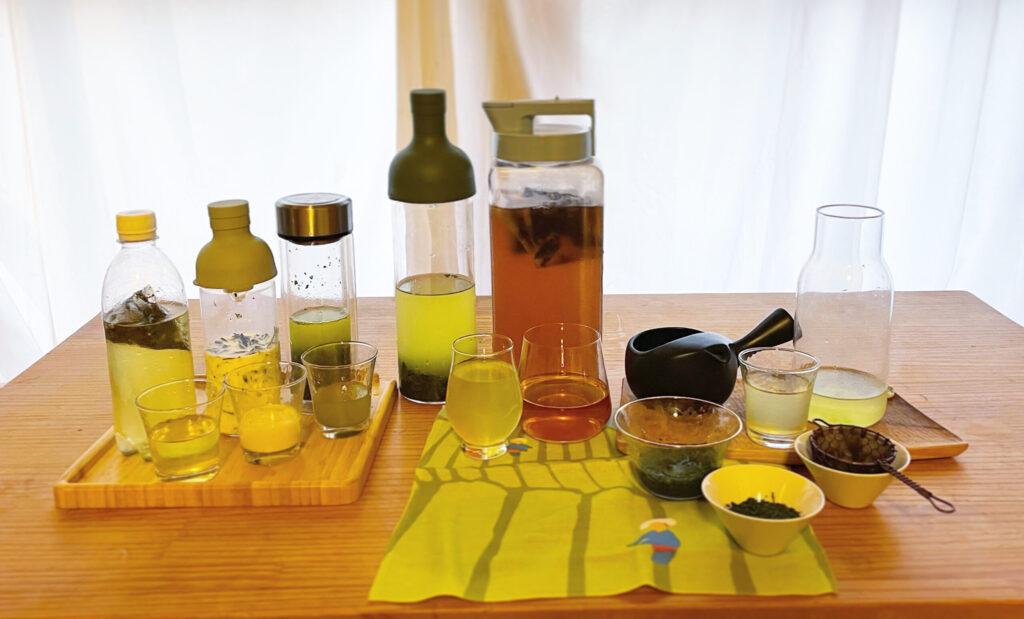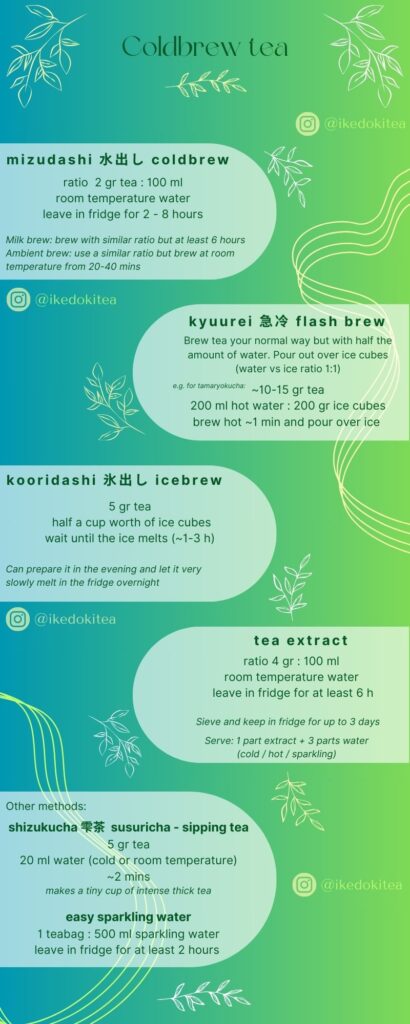How do I brew mizudashi (coldbrew) tamaryokucha?
Tamaryokucha is perfect for 水出し (mizudashi) coldbrewing: highlighting not only its refreshing, sweet and vegetal taste but also the delightful enchanting green colour.

The hot Japanese summer has inspired us to try out different tea coldbrew techniques to help us stay refreshed and quench our thirst.
The photo above was taken after our monthly tea session in August, where we focused on sharing some of our coldbrewing techniques and shared the below infographic with short brewing descriptions.
Tamaryokucha is steadily gaining a reputation in Japan for being the perfect mizudashi (水出し) / coldbrew tea. We hope to promote this reputation to the wider world as we feel this should not be kept secret within Japanese borders!
Due to the deep steaming during processing, it brings out the most magical green colour palette (making a tea that looks spectacular presented in a wine glass for instance). The flavours range with tamaryokucha from different producers from very softly sweet, mild & refreshing to more boldly vegetal yet sweet.
Coldbrewed teas tend to naturally reduce bitters in any tea, and enhance their sweetness and umami as the extraction rate for sweetness & umami whilst brewing at cold temperatures is much higher than any extraction of bitterness or astringency.
There are many different ways to coldbrew a tea, playing with ratios, temperatures and techniques.
These recipes shared here will each highlight slightly different characters within a tea and we heartily recommend trying different recipes out with the same tea to see how the different techniques can slightly change the flavours and shift the balance in the tea.

COLDBREW TEA
- mizudashi 水出し coldbrew:
Ratio: ~2 gr / 100 ml (approx. 1/2 cup)
Use room temperature water
Leave in the fridge for 4 – 8 hours
The optimal time depends on each tea, just experiment to see what suits your taste.
Variations:
Milk/plant milk brew: brew with similar ratio but at least 6 hours (works particularly well with houjicha teas)
Ambient brew: use a similar ratio but brew at room temperature from 20-60 mins
. - kyuurei 急冷 flash brew
Brew tea your normal way but with half the amount of water. Pour out over ice cubes
(water vs ice ratio 1:1)
~10-15 gr tea
200 ml hot water : 200 gr ice cubes
Brew hot for ~1 min and pour over the ice cubes
This is a great way of quickly preparing a cold tea. Due to first brewing hot, the tea will be a little more bold in character, with more texture and possibly some bitterness (depending on if the tea has any bitterness when brewed hot).
. - kooridashi 氷出し ice brew
5 gr tea
Half a cup worth of ice cubes
Wait until the ice melts (~1-3 h)
You can prepare it in the evening and let it very slowly melt in the fridge overnight.
. - tea extract
Ratio 4 gr : 100 ml
Room temperature water
Leave in fridge for at least 6 h
Sieve and keep in fridge for up to 3 days
Serve: 1 part extract + 3 parts water (cold / hot / sparkling)
This is an easy way of preparing coldbrew tea for large events. The tea extract will give a stable flavour profile that is excellent for food pairings, and makes it easy to consistently control the temperature at which the tea is served.
. - Other methods:
Shizukucha 雫茶 susuricha – sipping tea
5 gr tea
20 ml water (cold or room temperature)
~2 mins
This technique makes a tiny cup of intense, thick tea.
Easy sparkling water
1 teabag (~2 gr) : 500 ml sparkling water
Leave in fridge for at least 2 hours
We hope you have fun exploring your teas with different brewing methods. Perhaps you’ll fall unexpectedly back in love with one of the teas that you had sitting at the back of your cupboard. And of course we recommend trying our tamaryokucha teas with these coldbrew methods!
*Ambient tea brewing & tea extract techniques have been inspired by Timothy d’Offay (Postcard Teas) book Easy Leaf Tea and by Mariëlla Erkens, author of Tea: Wine’s Sober Sibling.